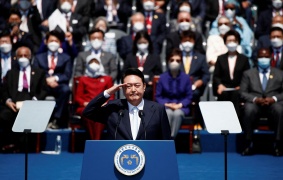
The global economic order is at an inflection point. South Korea, the 11th largest economy and a technologically advanced democracy, will play an important role in the future of advanced manufacturing with cutting-edge technologies, the evolution of the regional trade architecture, and in transnational issues such as development finance and infrastructure, climate change, and green growth. Opportunities for cooperation in these areas abound, especially with South Korea’s closest ally the United States, but obstacles also lie ahead.
On May 25, the Center for East Asia Policy Studies at the Brookings Institution will host a series of discussions to assess South Korea’s role in the new geoeconomics of Asia. The keynote session will feature a discussion with Tarun Chhabra, senior director for technology and national security at the National Security Council, on recent developments in the U.S.-ROK relationship, overlapping interests in high-tech industries such as semiconductors, and investment by South Korean firms in the U.S. Following the keynote discussion will be two expert panels on South Korea’s role in Asia’s new trade architecture and as a provider of regional public goods to the region.
Online viewers can submit questions for the speakers via e-mail to [email protected] or via Twitter at #ROKgeoecon.











